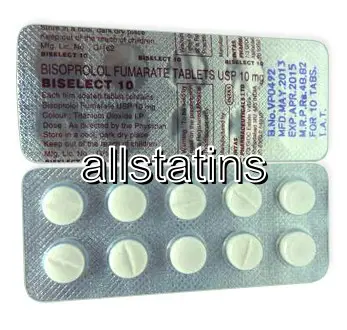| Package | Dosage | Price | Price per Dose | |
|---|---|---|---|---|
| Dosage: 5mg | ||||
| 360 pill | 5mg | NZD625.11 | NZD1.73 | |
| 180 pill | 5mg | NZD343.95 | NZD1.91 | |
| 120 pill | 5mg | NZD254.21 | NZD2.12 | |
| 90 pill | 5mg | NZD209.35 | NZD2.33 | |
| 60 pill | 5mg | NZD155.51 | NZD2.60 | |
| 30 pill | 5mg | NZD92.69 | NZD3.11 | |
| Dosage: 10mg | ||||
| 180 pill | 10mg | NZD308.05 | NZD1.70 | |
| 120 pill | 10mg | NZD227.29 | NZD1.88 | |
| 90 pill | 10mg | NZD182.43 | NZD2.03 | |
| 60 pill | 10mg | NZD137.56 | NZD2.27 | |
| 30 pill | 10mg | NZD80.73 | NZD2.66 | |

Bisoprolol Description
Introduction to Bisoprolol
Bisoprolol is a widely prescribed medication belonging to the class of beta-blockers. It is primarily used to treat cardiovascular conditions such as hypertension (high blood pressure) and angina (chest pain). The medication works by blocking certain receptors in the heart called beta-adrenergic receptors. This results in a slower heart rate and reduced force of contraction, which helps to lower blood pressure and decrease the heart's oxygen demand. Because of its specific selectivity for beta-1 receptors, Bisoprolol tends to have fewer side effects related to lung function compared to less selective beta-blockers.
Effectiveness and Benefits
Many patients find Bisoprolol to be highly effective in managing their blood pressure. It helps in reducing the risk of cardiovascular events such as strokes, heart attacks, and other complications associated with hypertension. Patients with angina also report a decrease in chest pain episodes after starting this medication. One significant advantage of Bisoprolol is its once-daily dosing, making it convenient for those who require long-term treatment. Its gradual absorption and long half-life ensure stable blood levels, providing consistent therapeutic effects. Overall, Bisoprolol is often favored for its targeted action and manageable side effect profile.
Possible Side Effects and Precautions
Like all medications, Bisoprolol may cause side effects in some individuals. Common adverse effects include fatigue, dizziness, cold hands and feet, and gastrointestinal discomfort. Some people may also experience a slowing of the heart rate or low blood pressure. Because of its action on the heart, it is important for patients with pre-existing heart conditions or severe respiratory issues to consult their healthcare provider before starting Bisoprolol. Regular monitoring of blood pressure and heart rate is recommended during treatment to ensure safety and effectiveness. Certain medications and health conditions can interact with Bisoprolol, so full disclosure with a healthcare professional is essential.
Usage Guidelines and Dosage
Bisoprolol is usually prescribed once daily, with or without meals, depending on the doctor's instructions. Typical starting doses range from 5 mg to 10 mg, which can be adjusted based on individual response and tolerance. It is important not to abruptly stop taking Bisoprolol without medical guidance, as sudden discontinuation may lead to increased blood pressure or angina. Patients should adhere strictly to their prescribed regimen and keep their healthcare providers updated on their health status. Consistent use is key to achieving optimal blood pressure control and cardiovascular health benefits.
Final Thoughts
In summary, Bisoprolol is a reliable and effective medication for managing hypertension and angina. Its selective beta-1 blocking action makes it a preferred choice for many patients requiring long-term therapy. While it generally has a good safety profile, attention to dosage, potential interactions, and regular monitoring are crucial. Patients should discuss any concerns or side effects with their healthcare provider to ensure the best outcomes from their treatment plan.
